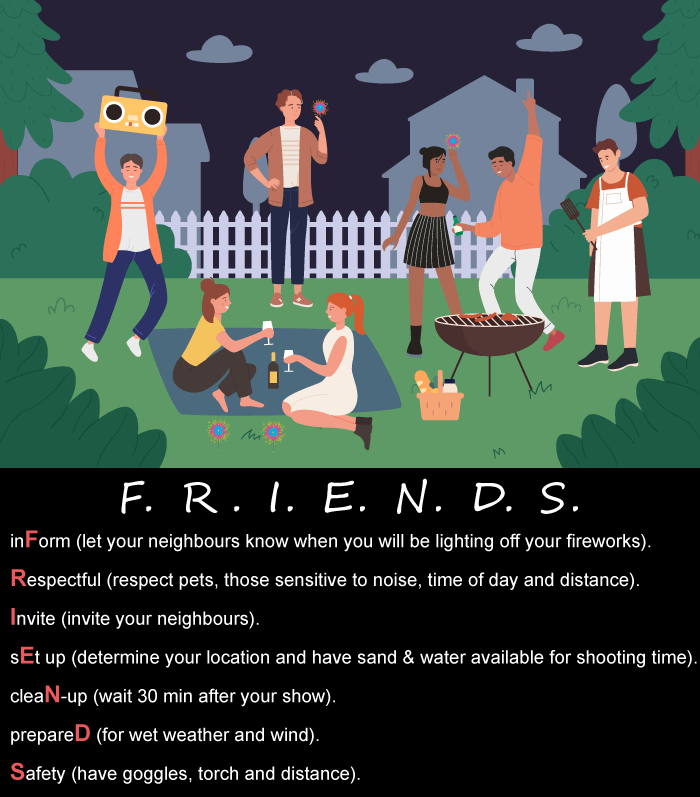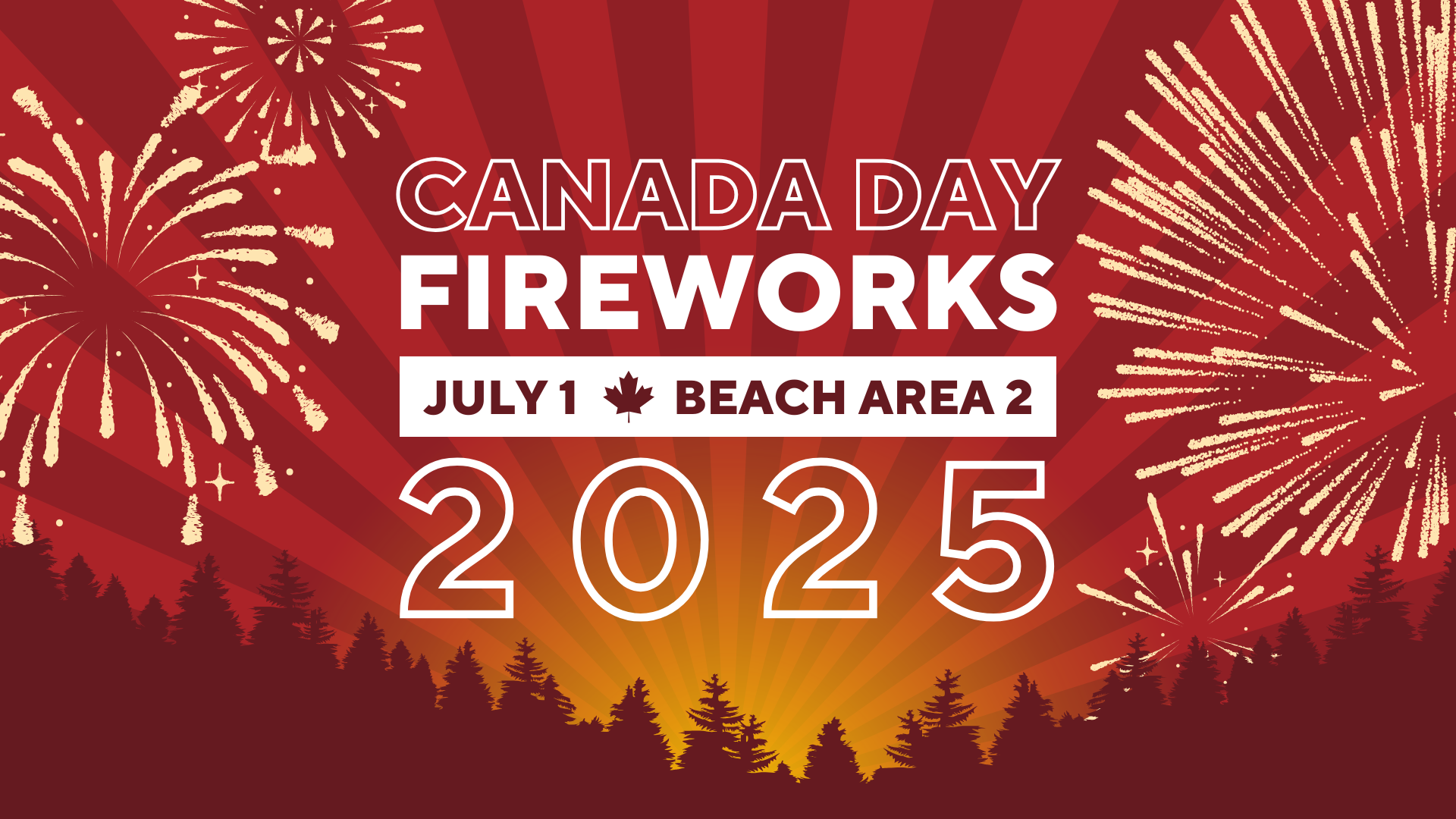Fireworks in Wasaga Beach: What You Need to Know
Fireworks can be a spectacular way to celebrate holidays and special events—but in a community like Wasaga Beach, it's essential that they're used safely and respectfully. With growing concerns around noise, fire hazards, and the impact on pets, wildlife, and local residents, the Town of Wasaga Beach has established clear guidelines for when and how fireworks can be enjoyed. This page outlines everything you need to know—from safe setup and disposal, to by-law enforcement, fines, and how to protect those most affected by loud displays.
Below are some frequently asked questions, however if you wish to discharge family fireworks, please familiarize yourself with the Fireworks By-law to ensure you are not in contravention of any rules or regulations.
| Fireworks Safety |
|
Permitted Uses Fireworks are allowed only on designated days: Victoria Day, Canada Day, New Year's Eve, and New Year's Day. They can only be set off on private property with the owner's consent. Public displays require a permit from the Fire Chief. Setting off fireworks in public spaces like beaches, parks, or streets is prohibited. Noise travels farther than you think. A few small steps can go a long way toward keeping your community comfortable and safe. You can reduce the impact by:
Safe Setup of Fireworks To prevent injuries and fires, follow these key steps when setting up:
Fireworks to Avoid Not all fireworks are safe or legal. Avoid the following:
Always buy from reputable, licensed retailers, and check that the fireworks are approved by Natural Resources Canada. Fireworks Disposal After the show, cleanup is critical for safety and the environment:
|
| Noise Considerations |
|
Fireworks are fun—but loud explosions can disturb others, especially at night. To minimize disturbance, Wasaga Beach restricts fireworks to specific holidays, and strongly encourages residents to keep displays short, early in the evening, and away from densely populated areas. Being mindful of noise helps ensure that everyone can enjoy the holiday—whether they’re watching the sky light up or trying to get a peaceful night’s sleep. Why are fireworks so loud? It all comes down to the chemical reaction that happens after the fuse is lit. The burning gunpowder releases hot gas that expands rapidly; when the gas expands to the point that it runs out of room within the firework, the resulting explosion causes a blast wave. The vibrations from that blast wave have the potential to cause permanent damage to the delicate hair cells of the inner ear. When it comes to fireworks, the World Health Organization recommends the maximum safe decibel level for adults is 140 decibels, and for children only 120 decibels. Protecting your hearing now will enable you to enjoy the sounds of the fireworks for years to come. Keep a Safe Distance Fireworks create noise and a blast wave that can harm your hearing. One way to reduce the risk of damage is to maintain a safe distance from the display. The farther the better, but a minimum distance of around 500 feet will still give you a great view without the sound pressure that can damage the tiny hair cells in the inner ear.
|
| Animal Safety |
|
Fireworks can be extremely distressing for animals, especially pets like dogs and cats who are sensitive to loud sounds and flashing lights. Sudden bursts of noise can trigger anxiety, cause pets to hide, shake, or even run away. To keep your animals safe during fireworks, always keep them indoors with windows and curtains closed to help muffle the sound. Create a calm environment with familiar bedding or soft music, and never bring pets to a fireworks display. Small Pets Small animals (e.g., hamsters, gerbils, guinea pigs, rabbits, mice and birds) tend to frighten easily around loud noises. Here are some steps you can take to help them feel more at ease:
Dogs and Cats
For additional tips on how to keep your furry friend calm during firework celebrations during the Canada Day long weekend, talk to your veterinarian or a certified positive reinforcement-based behaviour expert |
| Enforcement & Fines |
|
Enforcement The Town of Wasaga Beach is committed to maintaining a strict but fair approach when it comes to fireworks enforcement. While the regulations surrounding the use of fireworks are firm—aimed at ensuring the safety of our residents, protecting wildlife, and minimizing disturbances—the enforcement is carried out with fairness and transparency. The Town recognizes that fireworks can be a fun and exciting part of celebrations, but it’s important for everyone to follow the rules for the well-being of the community as a whole. By-law enforcement officers monitor fireworks activity to ensure compliance, but they also strive to educate residents about the laws and the reasons behind them. Fines and penalties are applied where necessary, but enforcement measures are taken with the intent to guide, inform, and correct, rather than penalize unnecessarily. The Town encourages residents to report violations, knowing that each case will be treated thoughtfully and impartially, ensuring that everyone can enjoy their celebrations in a safe and respectful environment. Fines
|
| Reporting a Concern |
|
If you witness the unsafe use of fireworks, hear fireworks outside permitted dates, or are concerned about potential violations of the Town’s fireworks by-laws, you are encouraged to report it. During business hours (Monday to Friday, 8:00 a.m. to 4:30 p.m.), you can contact the Town of Wasaga Beach at 705-429-2511. Our summer hours begin May 12th, 2025 with extended hours (Monday to Thursday, 8:30 a.m. to 12:30 a.m. and Friday to Saturday, 8:30 a.m. to 2:30 a.m. - long weekends until 3:30 a.m.). For non-urgent issues, such as noise complaints or repeated disturbances, you can also submit a report online through the Municipal Law Enforcement Complaint Form. Your report helps keep our community safe, respectful, and enjoyable for everyone. |
| Public Fireworks Display |
|
Get ready for an unforgettable fireworks show at dusk to light up the night as we celebrate Canada Day! On July 1st come join us at Beach Area 2 at 9:00 p.m.
|















